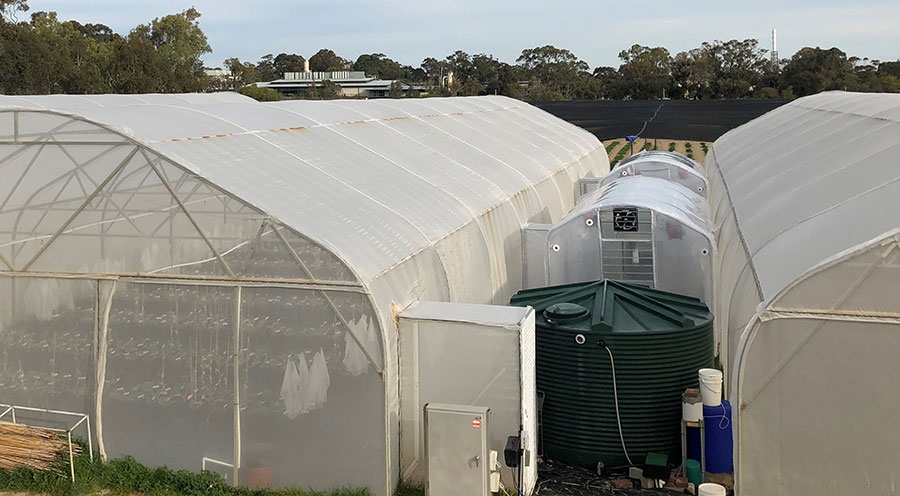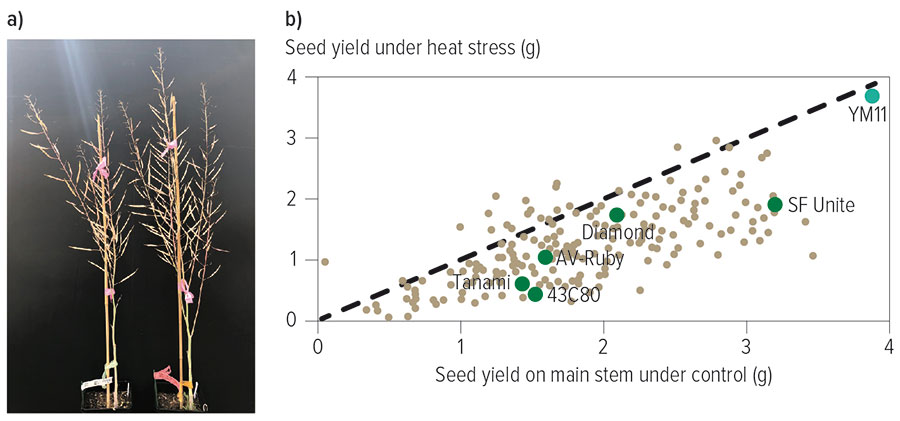Key points
- A prototype screen-house procedure for screening large numbers of canola genotypes for tolerance to heat stress during flowering is being developed for future use by canola breeders
- Genotypes that show promise in the screen-house are validated in the field for two years to evaluate heat stress tolerance through multiple times of sowing at each location
- A few selections for heat tolerance are evaluated in portable heat chambers in the field to measure heat tolerance stability under semi-controlled heat stress conditions during early flowering
Australian researchers are tackling canola heat stress tolerance with strategic pre-breeding research.
This renewed effort to strengthen canola’s climate resilience is drawing on results and background intellectual property from previous GRDC co-invested projects with the New South Wales Department of Primary Industries (DPI) and University of Western Australia (UWA). That earlier research showed a few hours of daily heat stress for three days during first flower could reduce canola grain yield by up to 30 per cent.
The new GRDC-supported UWA and NSW DPI project aims to:
- screen new germplasm for heat tolerance, develop screening procedures and genetic analysis;
- identify genes and molecular markers for use by canola breeders;
- field-validate the heat-tolerant genotypes in trials and improve trial design for measuring heat tolerance;
- evaluate stability and repeatability of heat-tolerant genotypes in portable heat chambers; and
- distribute confirmed heat-tolerant canola genotypes to Australian canola breeders.
Controlled-environment research
A new prototype heat-stress facility has been established for large-scale heat tolerance screening of canola germplasm, based on results of experiments at UWA since 2013. Significant heat tolerance in canola was found in 2020 in this heat tolerance facility:
The prototype heat-stress facility would be useful to commercial canola breeding programs, which seek to screen early generation lines for heat tolerance.
Building on GRDC and University of Western Australia (UWA) co-investment in heat stress research since 2013, UWA researchers have developed prototype pre-breeding facilities at UWA’s Field Station at Shenton Park for their mission to screen canola for increased heat tolerance.

Source: UWA
Field validating heat-tolerant genotypes
In 2020, the heat tolerance of 30 selected genotypes was validated in irrigated field trials with two replicates at five sowing times at Narrabri and Leeton in NSW. Results aligned with the UWA prototype screening, with three genotypes – YM11, Charlton-NCA18 and Yudal – performing well (Figure 1).
Figure 1: YM11, a heat-tolerant canola line originally from China, showed highest seed yield among 200 genotypes under both control and heat stress conditions in 2020. (A) YM11 showed excellent pod and seed set at maturity after seven days of control treatment (25/15°C, left plant with white tag) and heat stress treatment (32/22°C, right plant with red tag) at the early flowering stage. (B) Broad genetic variation existed in 200 genotypes. Some genotypes performed better than three OP cultivars (43C80, Tanami & AV Ruby) and two hybrid cultivars (Ignite and Diamond).

Source: UWA
In 2021, field testing of selected genotypes was repeated at four sites: Leeton and Condobolin in NSW, Kerang in Victoria and Dongara in Western Australia.
Stability of heat tolerant genotypes
Novel, portable heat chambers have been used to assess heat tolerance of canola in field environments since 2017 at NSW DPI, Wagga Wagga. This has enabled heat tolerance of varieties in natural field environments to be captured. Daily maximum temperatures of up to 35°C are imposed in these chambers for a few days while keeping moisture and nutrient levels at optimum levels.
Heat stress in these chambers has significantly reduced seed yield, harvest index and seed number per pod in canola varieties which were selected from multi-location trials. So far, wide genetic variation in heat tolerance has been observed with a few promising lines with good mean yield and good heat tolerance.
More information: Dr Sheng Chen, 0423238218, sheng.chen@uwa.edu.au; Dr Rajneet Uppal, 0436341649, rajneet.uppal@dpi.nsw.gov.au

























































